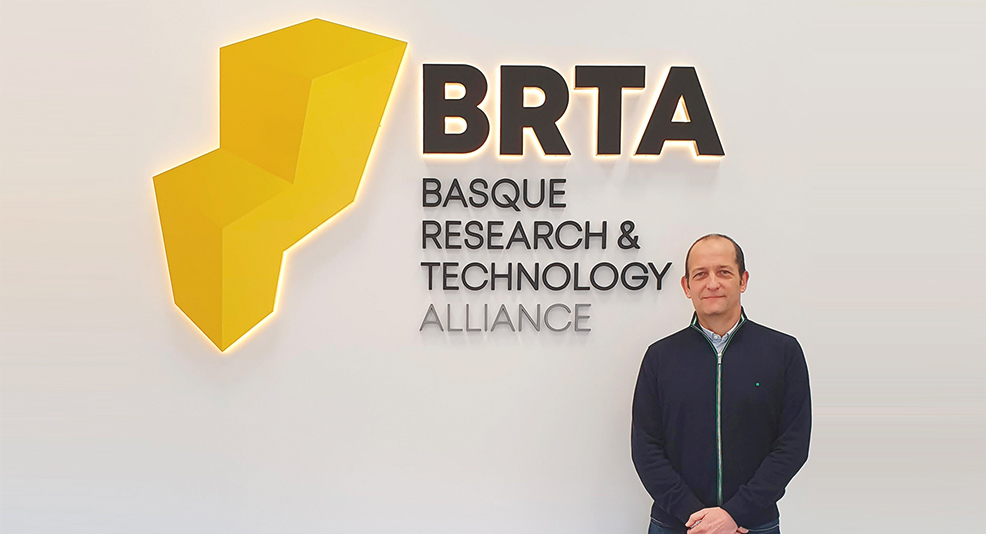Rikardo Bueno, director of the Basque Research and Technology Alliance (BRTA)
The Basque Research and Technology Alliance (BRTA) is a strategic alliance that was set up to address the Basque Country’s industrial challenges and compete with major corporations and leaders in terms of researching and developing technologies. It has made significant efforts aimed at enhancing the Basque Country’s technological ecosystem thanks to a collaborative agreement signed by 16 research and technology centres members of RVCTI (the Basque Science & technology Network) such as Tekniker, the Basque Government, the Provincial Councils of Álava, Bizkaia and Gipuzkoa and Grupo SPRI. In this interview, the organisation’s director, Rikardo Bueno, describes the main technological and industrial challenges currently faced by the Basque Country.
BRTA has just approved a new Strategic Plan for 2020-2021. Could you describe its main lines of action?
Our new Strategic Plan has identified several priority lines of action such as, for instance, scientific-technological activities for which we intend to define our operational framework by establishing a Research Agenda to address territorial socioeconomic challenges associated with science and technology.
Likewise, the plan also intends to address the area of human capital by developing its own training programme. Another goal is to attract and retain talent and develop a research career common to all technology centres and CICs.
Technology transfer is another of the plan’s strategic elements to be articulated by launching activities focused on valorising research outcomes and supporting the creation of new technologically based companies. Actions fostering more activities between companies shall also be intensified.
Another area of activity is related to communication and marketing actions to achieve an outstanding position at an international level and allow the alliance to project the image of what is a technologically advanced country to produce positive repercussions for our companies as well as sustainable growth and wellbeing for society at large.
Finally, mention must also be made of the economic-financial area and the support and services required to implement suitable management actions in terms of R&D&I designed to give support to organisations enabling them to improve their management systems by identifying best practices.
The ultimate goal of all the above is to make the scientific-technological knowledge originating from BRTA centres available to Basque society and its production facilities with a specific focus on excellence in order to deploy high-impact collaborative actions.
The current health care emergency situation is also affecting our economy and industries. What kind of role are technology centres like Tekniker playing with regard to improving the competitiveness of the Basque industrial fabric?
The role played by technology centres members of RVCTI (the Basque Science & Technology Network) is crucial in this highly complex scenario. These organisations are focused on researching and developing innovative solutions to address the industry’s challenges and this crisis has served to place their capabilities and expertise at the service of society to better cope with what is an extremely difficult context. Work has fundamentally focused on three separate fronts.
Firstly, and in terms of responding to the health care emergency, a number of solutions have been developed to properly address the lack of medical equipment and PPEs.
Secondly, work has focused on monitoring and tracking the pandemic by providing all the technological tools required by the industrial fabric. In this area, it has also been clearly demonstrated how valuable it is to cooperate as joint projects involving several BRTA centres have already been carried out.
Finally, major efforts have been made regarding the key mission that have not only been focused on strengthening our local businesses but also the industrial fabric itself. One of the consequences of the current scenario will be the need to set up more localised production networks for which industrial sovereignty will be required. Technology transfers to companies are helping us achieve this. In this regard, Tekniker is a centre of reference. Moreover, the organisation’s specialisation in terms of advanced manufacturing can be applied to all those sectors that need to manufacture and manage production in an efficient and sustainable manner.
What are the main technological and industrial challenges the Basque County is currently facing?
The Basque Country is now facing challenges associated with digitalising industries, the circular economy and environmental sustainability. To address these challenges properly it will be essential to develop advanced digital technologies such as AI, big data, cybersecurity or blockchain together with circular economy technologies such ecodesign or clean production. Once developed, it will be crucial to transfer all of them to the industrial fabric although without ever forgetting the spirit and great strength of Basque industries in terms of manufacturing technologies, a sector in which Tekniker is a reference and has made a valuable contribution.
Could you describe the main initiatives that a territory should carry out to guarantee its status as a highly innovative pole in Europe?
We must focus on developing cross-cutting projects to properly address social and industrial challenges and bring together driving-force companies and SMEs. These projects must be supported, at all times, by the knowledge of technology and research centres to generate global competitive advantages. In order to achieve this goal, we must intensify collaborative actions between the industrial fabric and the most outstanding actors of RVTCI (the Basque Science & Technology Network) and receive support from our public authorities to promote our country’s projects. There are certain areas that would be highly favoured by this approach such as electric mobility, circular economy or healthy aging.
We will also have to invest more in technological infrastructures to develops tests, trials, validations and scalings for technologies to reduce implementation risks for companies, particularly for SMEs, a field in which Tekniker is playing an outstanding role.



